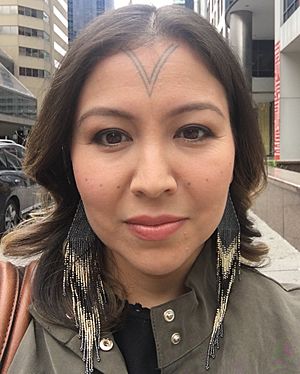Alethea Arnaquq-Baril facts for kids
Quick facts for kids
Alethea Arnaquq-Baril
MSC
|
|
|---|---|

Arnaquq-Baril in 2018
|
|
| Born | May 9, 1978 Frobisher Bay, Northwest Territories, Canada (now Iqaluit, Nunavut) |
| Occupation |
|
| Alma mater | Sheridan College |
| Genre | Documentary, Feature Films, Short Films |
| Subject | Inuit culture |
| Notable works | Tunnit: Retracing the Lines of Inuit Tattoos (2010) Angry Inuk (2016) |
| Notable awards | Canada's Meritorious Service Cross (MSC) in 2017 |
Alethea Arnaquq-Baril MSC (born May 9, 1978) is an Inuk filmmaker. She is known for her movies about Inuit life and traditions.
Alethea owns Unikkaat Studios, a film company in Iqaluit. This company makes films in Inuktitut, the Inuit language. In 2017, she received the Canadian Meritorious Service Cross. This award recognized her important work as an activist and filmmaker. She also works with the Qanak Collective. This group supports projects that help Inuit people.
Contents
Early Life and Education
Alethea Arnaquq-Baril grew up in Iqaluit, Nunavut, Canada. Her mother was an Inuk teacher. Her father worked in radio and later in technology.
Alethea first studied math at the University of Waterloo. She wanted to design video games. But her love for storytelling led her to Sheridan College in Ontario. There, she studied illustration. She also trained in animation at the Banff Centre. This program was offered by the National Film Board of Canada.
In 2011, Alethea shared her goal with the Canadian Broadcasting Corporation. She wanted to record Inuit history. Much of this history is passed down through stories told aloud. She wanted to record it while the elders who lived traditionally were still alive.
Filmmaking Career
Alethea Arnaquq-Baril started her film career as a producer. Her first documentary was James Houston: The Most Interesting Group of People You'll Ever Meet (2008). She also co-produced The Experimental Eskimos (2009).
In 2009, she wrote and directed her first film. It was an animated short film called Lumaajuuq: The Blind Boy and the Loon. The National Film Board of Canada helped make it. Later, Alethea wrote a children's book based on the film. It's called The Blind Boy and the Loon (2014) and is available in English and Inuktitut.
Her first full-length film was Tunnit: Retracing the Lines of Inuit Tattoos (2010). This personal documentary explored the lost tradition of Inuit facial tattoos, called kakiniit. Between 2011 and 2018, Alethea worked on five more films. She worked as a producer, director, and screenwriter.
Her company, Unikkaat Studios, makes Inuit cultural documentaries and Inuktitut films. She also co-owned Tajarniit Productions. This was a group project with other Inuit women filmmakers. In 2017, the Toronto International Film Festival named her one of Canada's most important women filmmakers.
Alethea and Stacey Aglok MacDonald created a TV comedy series. It is called North of North and is set to premiere in 2025.
Key Films by Alethea Arnaquq-Baril
Lumaajuuq: The Blind Boy and the Loon (2009)
This animated short film tells a traditional Inuit story. It's about a mother who treats her blind son badly. A loon helps the son regain his sight. The film won awards, including Best Canadian Short Drama at the imagineNATIVE Film and Media Arts Festival in 2010. It also won the Golden Sheaf Award for Best Indigenous category.
Tunniit: Retracing the Lines of Inuit Tattoos (2010)
This documentary looks at tunniit, the tradition of face tattooing among Inuit women. This practice was almost forgotten and once forbidden. Alethea travels to interview Inuit community members. She learns about the cultural changes that caused the tattoos to disappear.
Inuit High Kick (2010)
Alethea directed Inuit High Kick. This short documentary shows Inuk athlete Johnny Issaluk doing a one-foot high kick. It was made for the Vancouver 2010 Olympics cultural events.
Aviliaq: Entwined (2014)
This short drama is set in the 1950s Arctic. It tells the story of two Inuit women who want to stay together. The film explores themes of relationships and family in Inuit culture during a time of big changes.
Angry Inuk (2016)
Angry Inuk is a full-length film. It shows how important seal hunting is to Inuit culture. It also explains how groups trying to stop the seal hunt have negatively affected Inuit lives. The film won the Vimeo On Demand Audience Award at the Hot Docs Canadian International Documentary Festival. It also received the Canadian Documentary Promotion Award. In December 2016, Alethea received the DOC Vanguard Award. Angry Inuk was also named one of "Canada's Top Ten" feature films of 2016 by TIFF.
Activism and Awards
Alethea Arnaquq-Baril supports the continuation of the Arctic seal hunt. She believes it is vital for Inuit communities.
Her films have won many awards:
- 2008: James Houston: The Most Interesting Group of People You'll Ever Meet won the Allan King Award for Excellence in Documentary.
- 2010: Lumaajuuq: The Blind Boy and the Loon won Best Canadian Short Drama at the imagineNATIVE festival.
- 2011: Throat Song was shortlisted for the Academy Awards (2014).
- 2016: Angry Inuk received the Vimeo On Demand Audience Award and the Canadian Documentary Promotion Award.
- 2016: Angry Inuk won the Audience Choice award at HotDocs.
- 2016: Angry Inuk won the Alanis Obomsawin Best Documentary Award.
- 2017: Angry Inuk won the Social Justice Award at the Santa Barbara International Film Festival.
- 2017: The Toronto International Film Festival recognized Arnaquq-Baril as one of Canada's most important women filmmakers.
See also
 In Spanish: Alethea Arnaquq-Baril para niños
In Spanish: Alethea Arnaquq-Baril para niños
 | Dorothy Vaughan |
 | Charles Henry Turner |
 | Hildrus Poindexter |
 | Henry Cecil McBay |

